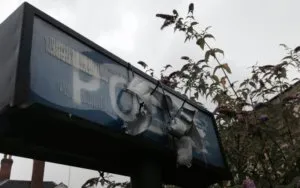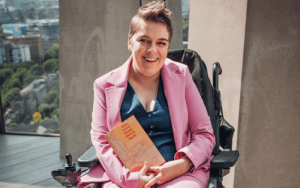Public bodies in Bristol are facing allegations of institutional disablism and racism, after the second case in four years in which a man has been convicted of the brutal murder of a disabled refugee.
Friends say that Kamil Ahmad had repeatedly told police officers that he was being threatened and racially abused by Jeffrey Barry, who lived in the same supported accommodation for people with mental health conditions in the Knowle area of Bristol.
Ahmad (pictured) was stabbed to death in the early hours of 7 July last year, just hours after Barry had been released from a hospital where he had been sectioned under the Mental Health Act.
Barry, 56, was convicted of murder this week, following a trial at Bristol Crown Court. He had denied murder but admitted manslaughter on the grounds of diminished responsibility. He will be sentenced on 10 November.
But Disability News Service (DNS) has been told that the Kurdish asylum-seeker made repeated calls to police officers in the months and years leading up to his death, telling them that Barry was threatening him and that he did not feel safe.
Friends of Kamil Ahmad have also told DNS that Bristol social services – which he had also told about his fears for his safety – was about to evict him and leave him homeless and destitute on the streets, and only announced that this decision had been reversed after he had been killed.
The revelations come four years after the death of Bijan Ebrahimi, a disabled refugee who was also brutally killed by a neighbour in Bristol – little more than a mile away, in the neighbouring Brislington area of the city – and who had also made repeated pleas for the police and other agencies to protect him.
A review of alleged failures by Bristol City Council and other local agencies in that case has not yet been published, more than four years after Ebrahimi’s death.
Kamil Ahmad had made repeated calls to Avon and Somerset police, which included reporting two assaults by Barry in October and December 2013, and another incident in April 2016.
Police said this week that the two assaults in 2013 were not taken any further because of a lack of corroborating evidence, and that Barry had claimed that he himself had been the victim, although he was detained under the Mental Health Act after the second incident.
Avon and Somerset police claims that Kamil Ahmad reported just four incidents to them between 2013 and 2016, but DNS has been told that he made many more reports that Barry had threatened and racially abused him, and that he repeatedly told the authorities that he did not feel safe.
Three months before he was killed, on 5 April 2016, Ahmad told police that Jeffrey Barry had again threatened him.
Despite insisting that he wanted the police to press charges, no further action was taken.
A police officer who had arranged to visit Ahmad and his interpreter Adil Jaifar in May 2016 to discuss the case never turned up for the appointment.
Avon and Somerset police admitted this week that officers had faced disciplinary action over the way they dealt with this incident.
A police spokesman told DNS: “There was one allegation of assault made by Mr Ahmad in April 2016 [following] which we did identify performance issues and these were dealt with locally in the form of words of advice given to the officers involved.”
He said Ahmad had reported that Barry had “blocked his path and searched him”, although “no injuries were sustained in the incident”.
He said the “performance issues” related to “a misunderstanding Mr Ahmad did not want to take the complaint further after speaking to officers on a number of occasions”, and he added: “After the words of advice were given we again made contact with Mr Ahmad who at that stage confirmed he did not want to pursue a criminal complaint.”
He said police records showed only four complaints made by Ahmad about Barry, and added: “It doesn’t appear that we recorded any allegations of threats other than those four.”
But Adil Jaifar has told DNS that his friend had made it very clear that he wanted Barry taken to court, and that Ahmad had made repeated complaints about Barry to the police.
He said he could not imagine him dropping the case, as he remembers Ahmad telling him: “I want to bring the matter to a court. It’s useless to speak or warn Jeff anymore.”
The following month, Barry – who has paranoid schizophrenia, and previously spent time in the high-security psychiatric hospitals Rampton and Broadmoor, and has a long criminal record – was finally arrested, and then sectioned, on 13 June, after displaying sexualised behaviour and making threats to kill people, and telling staff that “Kamil would be top of my list”.
But the Mental Health Tribunal later decided that he should be released, and soon afterwards, on 6 July, he returned to the house in Wells Road where they both lived.
The court heard that Barry had stopped taking the medication that was controlling his aggression, which the tribunal had been unaware of.
Avon and Wiltshire Mental Health Partnership NHS Trust failed to inform police that Barry had been released and would be returning to Wells Road, the court had heard.
The court also heard that the trust had failed to put in place a plan to support and monitor Barry after his release.
Ahmad, who had spent the evening of 6 July with his cousin, had no idea that his neighbour had been released from hospital.
In the early hours of the next morning, Barry attacked Ahmad in his room, after he had opened the door to him.
An hour before, Barry had phoned a mental health helpline to say that he was not in control of his actions and wanted to punch someone.
The police were told about the call, but only a few minutes before Barry phoned 999 to confess to murdering Ahmad.
Kamil’s brother, Kamaran Ahmad Ali, said he wanted to know why Kamil had not been protected, and why he had been failed by the mental health services and the police.
He told DNS: “That should not happen. They should have protected him. They should have looked after him.
“When they sectioned him, he threatened to kill [Kamil] and they didn’t do anything about it.
“I want to get to the bottom of it and find out why it happened and how it happened.”
Friends of Kamil Ahmad also believe he would still be alive if the police had listened to his concerns.
They say their friend was a quietly-spoken, funny, peaceful and generous man, who only wanted a safe place to live.
They say that the way he was let down by the police, social services, and other authorities, including the mental health trust, and the Home Office – which had rejected his asylum claim – shows how Britain treats most asylum-seekers like criminals.
Avon and Somerset police insists that there are no similarities to the case of Bijan Ebrahimi, and added: “We certainly don’t believe this case suggests an issue with institutional racism or disablism”.
But Rebecca Yeo, a friend of Kamil Ahmad, who worked with him on a UK Disabled People’s Council project to create a mural in Bristol that examined the experiences of disabled asylum-seekers, said: “Kamil was failed in getting the support he needed, both from the police and social services.
“He was threatened with street homelessness. He had years of being abused and he didn’t get the help he needed.”
Adil Jaifar added: “In Bijan’s case, he raised the alarm several times and he wasn’t listened to until this terrible thing happened, and the same with Kamil. It’s the same.”
Asylum-seekers are treated with “total disrespect”, he said. “You are vulnerable and you don’t have any power.
“The majority of asylum-seekers, they are viewed as criminals.
“If the system treats you as a criminal, what can you expect from the rest of society, and that is what is happening.”
Bristol City Council said that the Bristol Safeguarding Adults Board had commissioned a safeguarding adults review, and that it would “respond to any issues raised by the review”.
A spokeswoman said: “Unfortunately we cannot completely remove risk to the most vulnerable members of our society, but we are committed to protecting them whilst helping maintain their independence and we are continually improving practices wherever necessary to help prevent tragic incidents like this from happening.
“We do not wait for recommendations from reviews to make changes to help us do all we can to keep people safe.”
The council has refused to answer questions about the case, although it did say that it recognised “cosmetic similarities” with the death of Bijan Ebrahimi.
But a spokeswoman said that it was “vital in terms of challenging and improving our processes that all of the issues are carefully, methodically and independently examined”, and so the council would not be able to comment in depth until the reviews into the two deaths were completed.
Avon and Wiltshire Mental Health Partnership NHS Trust said it had “reviewed and strengthened our ways of working with other service providers, including the police, to improve our sharing of clinical and additional relevant information”, but refused to answer any questions.
Milestones Trust, the charity which runs the supported living accommodation where Kamil Ahmad and Barry lived, said it was carrying out an internal review, but also refused to answer any questions.

 Ministers are considering further extension to disability hate crime laws, after pledge on ‘aggravated’ offences
Ministers are considering further extension to disability hate crime laws, after pledge on ‘aggravated’ offences Disabled author swamped by hate speech after social media post on feminism
Disabled author swamped by hate speech after social media post on feminism Councils now only able to offer the ‘bare minimum’ of adult social care support, MPs are told
Councils now only able to offer the ‘bare minimum’ of adult social care support, MPs are told